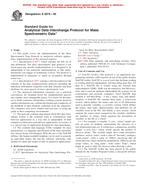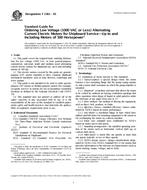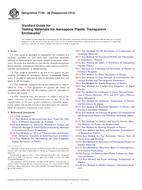1.1 This specification covers the general requirements for Vacuum Insulation Panels (VIP). These panels have been used wherever high thermal resistance is desired in confined space applications, such as transportation, equipment, and appliances.
1.2 Vacuum panels typically exhibit an edge effect due to differences between core and barrier thermal properties. This specification applies to composite panels whose center-of-panel apparent thermal resistivities (sec. 3.2.4) typically range from 87 to 870 m·K/W (12.5 to 125 hr·ft² oF/Btu in) at 24°C (75oF) mean, and whose intended service temperature boundaries range from -70 to 480oC (-94 to 900°F).
1.3 The specification applies to panels encompassing evacuated space with: some means of preventing panel collapse due to atmospheric pressure, some means of reducing radiation heat transfer, and some means of reducing the mean free path of the remaining gas molecules.
1.4 Limitations
1.4.1 The specification is intended for evacuated planar composites; it does not apply to non-planar evacuated self-supporting structures, such as containers or bottles with evacuated walls. The complexity of describing the performance of the planar products is considered sufficiently challenging for this initial specification, although other shapes will be considered at a future time.
1.4.2 The specification describes the thermal performance considerations in the use of these insulations. Because this market is still developing, discrete classes of products have not yet been defined and standard performance values are not yet available.
1.5 The values stated in SI units are to be regarded as the standard. The values given in parentheses are for information only.
1.6 This standard does not purport to address all of the safety concerns, if any, associated with its use. It is the responsibility of the user of this standard to establish appropriate safety and health specifications and determine the applicability of regulatory limitations prior to use. For specific safety considerations see Annex A1.
Product Details
- Published:
- 01/01/2000
- Number of Pages:
- 12
- File Size:
- 1 file , 130 KB


